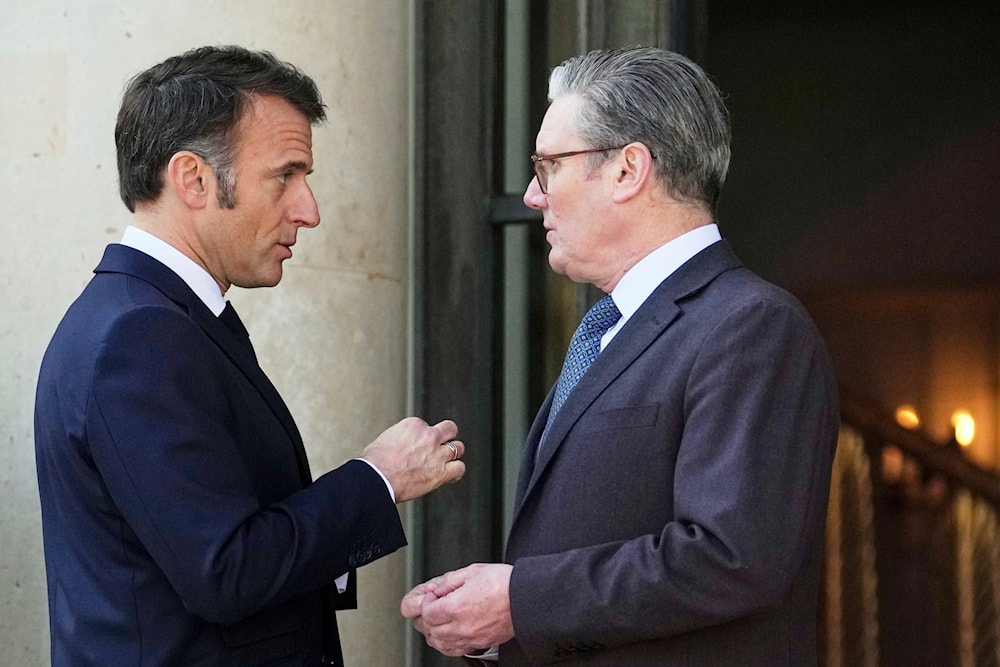Ukraine's allies meet in Paris to discuss new aid, security commitment
Macron announced France would provide an extra 2 billion euros in military aid to Ukraine, accusing Russia of distorting recent ceasefire agreements.
-

French President Emmanuel Macron, left, speaks with Britain's Prime Minister Keir Starmer during arrivals for a summit on Ukraine at the Elysee Palace in Paris on March 27, 2025. (AP)
France committed €2 billion in military aid to Ukraine, while around 30 leaders met with President Volodymyr Zelensky in Paris on Thursday to discuss strengthening Kiev's position and their potential role in any future peace deal with Russia.
This third summit of the so-called "coalition of the willing," led by France and Britain, includes British Prime Minister Keir Starmer, NATO Secretary-General Mark Rutte, Polish Prime Minister Donald Tusk, Italian Prime Minister Giorgia Meloni, and Turkish Vice President Cevdet Yılmaz.
The meeting follows Zelensky’s recent agreement to move forward with ceasefire talks to secure renewed US aid and intelligence cooperation. However, Russia has added new conditions regarding a Black Sea ceasefire and energy targets, while many European nations remain skeptical about the prospects of a peace agreement.
"First and foremost [we will discuss] the immediate support for Ukraine. It must go on because it is necessary to continue the resistance," President Emmanuel Macron told reporters on Wednesday evening at a press conference with Zelensky.
Macron pledged an additional €2 billion in French military aid, including missiles, warplanes, and air defense systems, while Zelenskiy suggested other partners might announce aid packages on Thursday.
The summit seeks to define Europe’s role in potential peace talks, with its conclusions to be shared with the US, despite its absence.
Focus of talks
Talks will focus on reinforcing Ukraine’s military to deter and overseeing limited ceasefires on maritime and energy targets, following US-led discussions in Saudi Arabia.
European leaders, led by Macron and Starmer, are reevaluating security plans for Ukraine, pivoting from troop deployments to alternative strategies amid political, logistical, and geopolitical challenges, including opposition from Russia and the US.
In a statement, Starmer's office said, "The Prime Minister will underline that all must come together to support Ukraine to remain in the fight and back US efforts to make real progress despite continued Russian obfuscation."
Officials stated that planning has considered all European military assets, including aircraft, tanks, troops, intelligence, and logistics, with discussions focusing on the contributions European nations could make to a potential future force.
Reassurance policy
Moreover, an outline document for Thursday's summit, as reported by Reuters, refers to a possible future "reassurance force" in Ukraine away from the front line "as part of a future peace settlement and with support of the United States."
Such a force positioned in Ukraine would aim to offer security guarantees.
"The objective is to allow Ukraine to keep the situation on the ground and resist the Russian aggression while building the credible elements to this lasting peace," Macron said.
Zelensky expressed hope for more clarity on which countries would commit to the force while acknowledging that the process was still in its early stages and complex.
Italian Foreign Minister, Antonio Tajani, emphasized his country's opposition to the proposed force, highlighting the differing views among Ukraine's partners. "Not sending troops on a mission unless they are part of the United Nations, (this) is the only condition for us to deploy military personnel" in Ukraine, Tajani said after a cabinet meeting on Wednesday evening.
Russian Foreign Ministry spokeswoman Maria Zakharova accused France and Britain on Thursday of hatching plans for "military intervention in Ukraine" under the guise of a peacekeeping mission, adding that such an intervention could lead to a direct military clash between Russia and NATO.

 4 Min Read
4 Min Read









